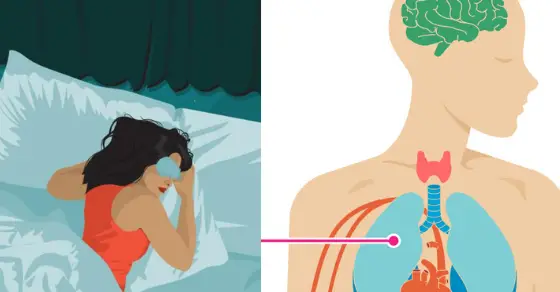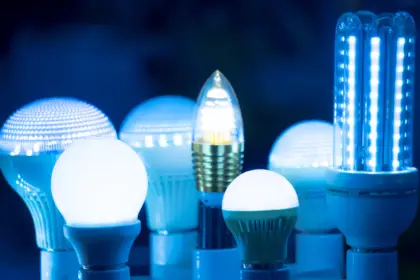There’s nothing worse than going to bed for a good night’s rest and waking up intermittently because of your own snoring or your partners snoring. Believe it or not, snoring is a sign of bad breathing habits while sleeping and in doing so these bad breathing habits lead to other health effects. Beyond waking up in the night intermittently which lowers the quality and time of your sleep, your body doesn’t get as much oxygen in it as it needs.
What Causes Snoring During Sleep?
Snoring is simply caused by mouth breathing instead of nose breathing. Remember this important fact: Mouths are for eating, noses are for breathing. This is very important to remember because your mouth is the pathway for food and water, along with drinks. You don’t inhale food, or water, or juice or tea. The nose is the pathway for breathing because our nose handles things that the mouth doesn’t.
Your nose hairs for example act as a natural air filter that aim to remove particles from the air that would otherwise by swallowed if inhaled through the mouth. The nose hair filters out these particles instead however. The nose also produces what is known as nitric oxide. This gaseous molecule enhances your circulation and helps the flow of blood to move more fluidly in the body.
Long story short, you want to breathe through your nose while you’re sleeping.
Stop Snoring & Sleep Apnea With These Important Exercises
(Click To View Video Presentation)
What Causes Sleep Apnea?
Sleep apnea is a bit different however. Sleep apnea is caused by the body stopping breathing during short periods of time while sleeping. If you have sleep apnea, you snore also. So beginning to focus on improving your snoring will also help to stop sleep apea as well. Not everyone who has sleep apnea snores, but there is a high likelihood you’re a mouth breather and snore as well. So both tend to go hand-in-hand with each other.
Sleep apnea causes people who are sleeping to gasp and wake up throughout the night as they are not getting enough oxygen. Sleep apnea can also be lethal if it progresses to a point of no return. According to Jenna Liphart Rhoads, RN, it can directly cause an individuals death:
“Sleep apnea can directly cause death by a person’s breathing being infrequent enough to create immediate tissue ischemia (tissue death from lack of oxygen) in the heart and/or brain, resulting in a fatal heart attack or stroke,” Jenna Liphart Rhoads, R.N., Ph.
Because of this, it is important to not simply see snoring and sleep apnea as light concern. Progressed, this can actually be life threatening. OSA (Obstructive Sleep Apnea) is when the upper airway collapses during sleep. This narrowing of the airways is most common among older males, but can occur in women too. Untreated OSA (Obstructive Sleep Apnea) Can Lead To:
- High Blood Pressure (Hypertension)
- Diabetes
- Stroke
- Heart Disease
- Pulmonary Hypertension
- Atrial Fibrillation (Abnormal Heart Rhythm)
Symptoms Of Obstructive Sleep Apnea Include:
Sleep Apnea during the day leads to decreased oxygen supply to the brain during the day as well as at night, as well as other vital parts of the body such as the cardiovascular system. This leads to sleep quality being poor as the body is not properly oxygenated. This can lead to daytime drowsiness or sleepiness throughout the day as sleep quality is poor.
Symptoms of Sleep Apnea Can Be:
- Gasping
- Choking
- Loud Snoring
- Snorting
- Interruptions in breathing patterns while asleep
People with OSA may also experience morning headaches from lack of oxygen, forgetfulness, drowsiness, feeling grumpy or disgruntled overall, waking up constantly throughout the night.
Other symptoms can be hyperactivity specifically with children. With adults, poor performance in school and on the job. Loss of sexual drive and appetite as the energy is not there anymore. Potentially contributing to depression as the brain is not properly oxygenated as well.
People Have Found These 3 Exercises To Remove Both Snoring & Sleep Apnea (Click Here To Try Them Out)
What Can You Do To Treat Sleep Apnea Or To Stop Snoring?
The most important thing that you can do to reduce or heal completely from sleep Apnea and to reduce snoring as well is to simply burn fat. Losing that fat and keeping it off allows for the body to breathe properly. Not only does burning that excess fat help with sleep Apnea but it also helps to bring blood pressure and blood sugar levels down as well.
Another tactic that has shown some progress for people is to sleep on their side as opposed to their back as this relieves pressure and allows for easier breathing in general.
Lastly, there are three very valuable exercises that the body needs in order to open this airway pathway again. This mitigates not only Sleep Apnea but also snoring as well.
There Are 3 Exercises That Create The Biggest Improvement For Sleep Apnea & Snoring: Visit This Video To Learn Them
If you’re specifically looking to stop snoring during sleep try getting a nasal dilator on amazon. These are like five bucks and they widen your nostrils so that you breathe more through your nose instead of your mouth. This decreases snoring and people have seen great results with it! Including my own brother. Click here to try these on amazon, they’re under 10 bucks and totally worth it!




